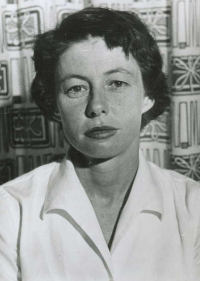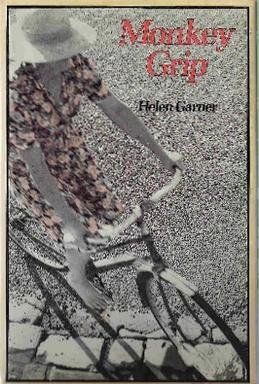
Helen Garner is an Australian novelist, short-story writer, screenwriter and journalist. Garner's first novel, Monkey Grip, published in 1977, immediately established her as an original voice on the Australian literary scene—it is now widely considered a classic. She has a reputation for incorporating and adapting her personal experiences in her fiction, something that has brought her widespread attention, particularly with her novels Monkey Grip and The Spare Room (2008).

Thea Beatrice May Astley was an Australian novelist and short story writer. She was a prolific writer who was published for over 40 years from 1958. At the time of her death, she had won more Miles Franklin Awards, Australia's major literary award, than any other writer. As well as being a writer, she taught at all levels of education – primary, secondary and tertiary.

Monica Elizabeth Jolley was an English-born Australian writer who settled in Western Australia in the late 1950s and forged an illustrious literary career there. She was 53 when her first book was published, and she went on to publish fifteen novels, four short story collections and three non-fiction books, publishing well into her 70s and achieving significant critical acclaim. She was also a pioneer of creative writing teaching in Australia, counting many well-known writers such as Tim Winton among her students at Curtin University.

Catherine Elizabeth Grenville is an Australian author. She has published fifteen books, including fiction, non-fiction, biography, and books about the writing process. In 2001, she won the Orange Prize for The Idea of Perfection, and in 2006 she won the Commonwealth Writers' Prize for The Secret River. The Secret River was also shortlisted for the Man Booker Prize.
Jenny Sages is an Archibald Prize People's Choice Award winning Australian artist. She is known for her abstract landscape paintings and portraits. She arrived in Australia in 1948. After being expelled from East Sydney Technical College, Jenny moved to New York to study at Franklin School of Art. She was a freelance writer and illustrator for Vogue Australia until the 1980s before starting full-time painting in 1985 at the age of 52. Her career transformation was greatly influenced by a trip to Kimberley, Western Australia, where she felt enchanted by the local indigenous culture. Her unique style is created using wax and pigments and the minimal use of brushes.
Kate Constable is an Australian author. Her first novel was The Singer of All Songs, the first in the Chanters of Tremaris trilogy. It was later followed by The Waterless Sea and The Tenth Power.
Dr. Kerryn Lee Goldsworthy is an Australian freelance writer and former academic.

Joan Elizabeth London is an Australian author of short stories, screenplays and novels.

Anna Louise Goldsworthy is an Australian classical pianist, writer, academic, playwright, and librettist, known for her 2009 memoir Piano Lessons. She has held several academic positions, and as of 2023 is director of the Elder Conservatorium at the University of Adelaide. She is a founder member of the Seraphim Trio, which has toured Australia and the world since 1995.
M. Barnard Eldershaw was the pseudonym used by the twentieth-century Australian literary collaborators Marjorie Barnard (1897–1987) and Flora Eldershaw (1897–1956). In a collaboration that lasted two decades from the late 1920s to the late 1940s, they published 5 novels, 3 histories, a radio drama, a collection of short stories, and several collections of critical essays and lectures.

The Spare Room is a 2008 novel by Australian writer Helen Garner, set over the course of three weeks while the narrator, Helen, cares for a friend dying of bowel cancer.
The Children's Bach, Op. 74, is a chamber opera by the Australian composer Andrew Schultz to a libretto by Glenn Perry, based on the 1984 novella of the same name by Helen Garner. The work was commissioned by the Melbourne-based group Chamber Made and their artistic director Douglas Horton with the aid of an Australia Council Project Fellowship; it premiered for a run of 15 performances at the Malthouse Theatre's Merlyn Theatre on 20 June 2008.
Sophie Cunningham is an Australian writer and editor based in Melbourne. She is the current Chair of the Board of the Australian Society of Authors, the national peak body representing Australian authors.
The Australian Prime Minister's Literary Awards (PMLA) were announced at the end of 2007 by the incoming First Rudd ministry following the 2007 election. They are administered by the Minister for the Arts.

Monkey Grip is a 1977 novel by Australian writer Helen Garner, her first published book. Set in Melbourne, the novel follows single-mother Nora as she narrates her increasingly tumultuous relationship with a heroin addict, juxtaposed with her raising a daughter while living in bohemian share houses.

This House of Grief is a 2014 non-fiction book by Helen Garner. Subtitled "The story of a murder trial", its subject matter is the murder conviction of a man accused of driving his car into a dam resulting in the deaths of his three children in rural Victoria, Australia, and the ensuing trials. The book has been critically lauded, with The Australian declaring it a "literary masterpiece".
Paul Mitchell is an author of five books in Melbourne.
Josephine Moon is an Australian author, based in Cooroy, Queensland. She has worked as an English teacher and editor. She has a Bachelor of Communications. She changed to a writing career after having Chronic fatigue syndrome.
This article presents a list of the historical events and publications of Australian literature during 1996.
Daniel Davis Wood is an Australian author who is known for the novels Blood and Bone and At the Edge of the Solid World.








